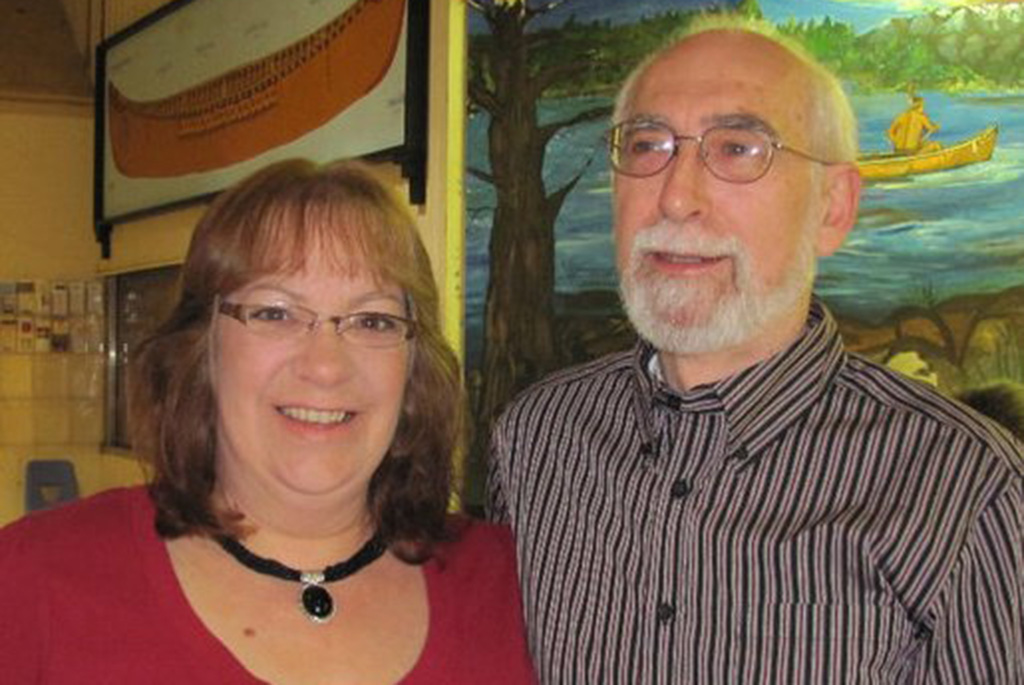
Valerie Cartonio: Graduate student creates podcast for people impacted by incarceration
For more than 20 years, Valerie Cartonio has worked inside jails and prisons, providing education about substance abuse prevention, doing HIV testing and counseling, re-entry planning, inmate advocacy and mentoring.
As part of their recently completed Master of Arts degree in Peace and Reconciliation Studies, Cartonio created a podcast, specifically designed for people who are in jail or prison, or otherwise affected by incarceration. Season one of “Prison POD” debuted in January. Each episode offers short strategies and lessons about how to manage time, emotions, and restore hope for incarcerated people, their families and friends. It is available on various podcast apps or at the show’s online feed.
A native of Scarborough, Maine, Cartonio now lives in Veazie. They also have a bachelor’s degree from UMaine in Sociology, with a concentration in Crime, Law, and Justice, as well as minors in Native American Studies and Peace and Reconciliation Studies.
Tell us about “Prison POD” in a nutshell?
The “Prison POD” podcast is for people who are in jail or prison, or whose lives have been affected by incarceration. The purpose is to save lives, restore hope and reduce recidivism.
What inspired you to produce a podcast for people who are in jail/prison or affected by incarceration?
I started a nonprofit with a friend of mine many years ago (2003) that was involved with prison work. At the time I was also producing a radio program at WMPG on the University of Southern Maine campus. My prison work started in radio, covering stories about incarceration on my program. Eventually, this led to us doing the volunteer training at several facilities, and the start of our volunteer work in the prisons.
You’ve been working with the Maine State Prison and other institutions to get the podcast to incarcerated individuals. How is that going? Have you received any response either from prison officials, people who are incarcerated or their families?
I have been corresponding with warden Matthew Magnussen at the Maine State Prison. He now has the first three episodes in mp3 format to be directly downloaded onto tablets at that facility. I am also involved with Maine Prisoner Re-Entry Network (MPRN), which has between 40-65 attendees each week, all involved in some sort of work that involves community/social services, re-entry, substance use disorders or prisons. There are residents from various correctional facilities who attend, previously incarcerated individuals, doctors, lawyers, police officers, jail officials and concerned citizens. I recently presented to 57 members of MPRN. So, right now the word is getting out.
Each facility is different. Those who are listening now are all involved in some sort of educational programming where they have access to tablets or computers. One or two have LinkedIn accounts and have accessed the recordings there. At Southern Maine Women’s Re-entry Center some students have access to Spotify, which the podcast is available on. All of those listening at this time are involved in weekly Zoom meetings with MPRN. Those listening have been very responsive in a positive light and looking forward to more.
There is also a support group called Roses Room for friends and families of people who are incarcerated. I attended one meeting of that group and talked about the podcast.
What’s your professional background?
I have worked in many occupations over my life. Before attending UMaine, I worked with adults with developmental disabilities, my main client had down syndrome. I found this work challenging and rewarding. I had a back injury in 2000 that prevented me from continuing that work. I entered UMaine through the ONWARD program in 2007. I took a break from my studies to work on a four-year contract with Wabanaki Health and Wellness, working in the area of substance abuse education and prevention, along with doing HIV testing and counselling.
What attracted you to the master’s program in Peace and Reconciliation Studies?
I actually wanted to do a master’s in Sociology, but that was not available at UMaine. My husband and I moved from Portland in 2006 for me to attend the university, so I did not want to go somewhere else. I had a minor in Peace and Reconciliation Studies, and felt that it blended well with Sociology, so that is how I made the decision to continue my studies and earn a master’s.
Did you work closely with any professors or mentors during your master’s program? If so, who and how have they helped you grow academically or personally?
Jason Canniff was a great advisor. He made you think for yourself by giving some guidance and suggestions, such as using the library research staff. He was encouraging and honest. He cared about the work I was doing and what the final product would be. He challenged me, and he met with me regularly (on Zoom since he was in Indonesia), and was available by email and WhatsApp.
Karyn Sporer, assistant professor in the Department of Sociology, invited me to present in her classes. We were in communication the whole time I was doing my master’s program.
UMaineOnline advisor Amanda Cupps deserves a medal of honor!
Finally, Julie DellaMattera, director of the School of Learning and Teaching in the College of Education and Human Development, stepped in without any notice when I was without an actual advisor. She helped immensely with getting me prepared to do my plan of study for my master’s project.
What difference has UMaine made in your life?
I went back to school at 47. I was the first one in my family to go to college. My son followed. My education at UMaine is helping make my dreams come true. It has helped validate all my work for 20 years to make a difference for those who are incarcerated.
Describe UMaine in one word.
Community.
Contact: Casey Kelly, casey.kelly@maine.edu.
